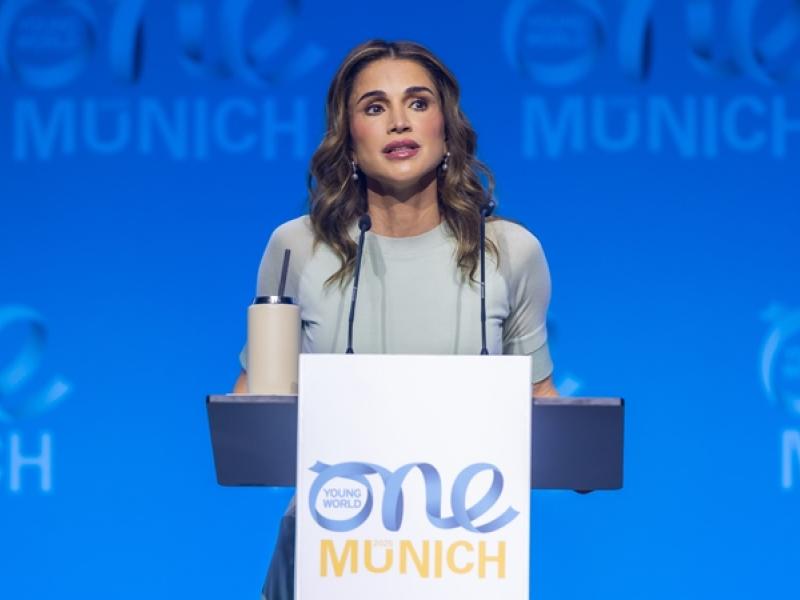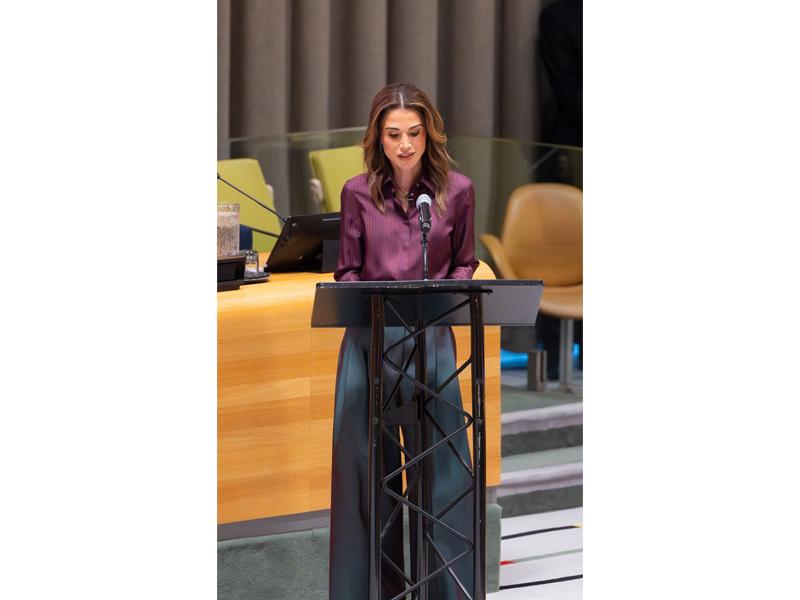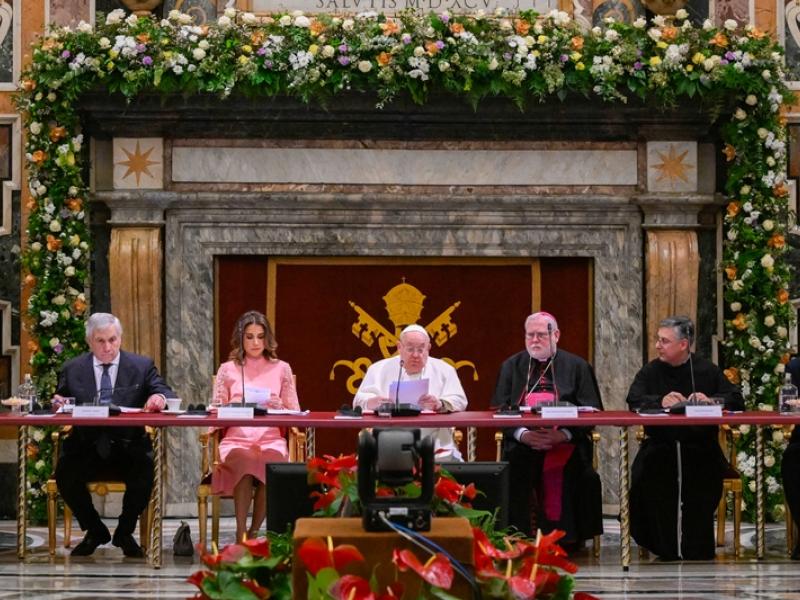Bismillah ar-Rahman ar-Rahim.
Thank you all for this warm welcome. And I especially want to thank Mr. Carlos Slim for inviting me to this wonderful gathering, and for his steadfast belief that philanthropy should not just ease suffering, but open up doors.
It’s truly an honor to be with such a remarkable group of young people. It has been a while since my last visit to Mexico, but this country remains as beautiful and as dynamic as I remember it.
Despite such beauty though, these days, the world seems so chaotic, that I find myself looking for new ways of thinking and seeing and understanding.
And recently, I’ve been captivated by the Vera C. Rubin Observatory – an extraordinary telescope built deep in the mountains of Chile.
This telescope doesn’t just gaze at the stars — it captures the universe in motion. Every five seconds, it moves, taking a thousand photos each night with the world’s largest digital camera. Those images create a time-lapse film of the southern sky, revealing patterns and movements that were once hidden.
This telescope is more than a scientific marvel. It is a reminder of the power of perspective, not just to look outside of ourselves but to choose where to focus and what to see.
And more than ever, perspective is what we need right now.
You guys understand this better than most. After all, you have entered adulthood at a pivotal moment, not just in your own lives, but in the life of the world. AI and other emerging technologies are transforming every aspect of our reality, at breakneck speed.
We stand at the intersection of exceptional potential and unprecedented risk, the ground shifting beneath us faster than we can adjust. It feels like we’re stepping, or perhaps even slipping, straight into the future.
And we wonder, is AI a force for good or for harm?
This is not a new question. Throughout history, every leap forward – from the printing press to the Industrial Revolution– has been met with both excitement and fear. And there was cause for concern.
The printing press unleashed knowledge, but spread discord and propaganda. The Industrial Revolution ushered in modern life, but widened inequality. The internet connected the world, but fueled misinformation and division.
Looking back, I wonder: could humanity have made these advances more thoughtfully? With more foresight? More perspective? Magnifying the benefit, while mitigating the harm. Because change is not innately good or bad. It is what we choose to make of it.
Now, unlike previous leaps, AI is omnipresent, transforming every aspect of life. The questions it raises are more complex, more critical.
Too often, we are so enamoured by technology, so dazzled by its shine, that we don’t stop to ask, do we want this? Does it serve our humanity? Are we clear on our priorities?
Today, we are racing forward faster than we are asking these questions. We optimize systems, turning people into collateral. And then we let those very systems override our moral compasses.
But let’s not fool ourselves. We talk about AI as if it is not in our hands, but the choice is entirely ours. Technology will shape the future, but we are the ones who will shape the technology.
With the right perspective, we can reorient our progress…not just toward what is possible, but toward what is right.
But how do we find that perspective? I think the Rubin telescope suggests a way. Just as it broadens our view of the constantly changing cosmos, we need a lens focused on Earth that does the same. A lens that demands we pause and notice what flickers in the distance.
For me, for many people not just in the Middle East but around the world, that lens — the one that forces us to see with moral clarity — has been Gaza.
So, I want to take a moment to speak plainly about what we’re seeing in Gaza… and then talk about what it means for all of us – especially for young people, the future leaders of our society.
The devastation in Gaza has been apocalyptic, the cruelty unmistakable. Homes and histories reduced to rubble… Tens of thousands of people killed. Israel is starving the entire population under a blockade that cuts off every lifeline. Doctors, weak from hunger, struggle to treat patients with scarce resources. Journalists bravely reporting from the front lines are killed with impunity.
We don’t need the world’s most powerful telescope to identify what experts have deemed a genocide. It is happening in plain sights.
And it demands a reckoning.
For many across the world, Gaza is challenging perspectives and fundamental assumptions. It is compelling people to ask: which narratives are presented as unquestioned truth… and why? It exposes how facts can be twisted. Unspeakable suffering excused. Entire populations dehumanized.
And yet people are bullied into accepting distortions as truth, even when evidence suggests otherwise.
Because, in times of endless disruption, distraction, and noise, life dissolves into an ambiguous blur… threatening to dull our moral instincts and erase the line between right and wrong.
But let us be clear: there is no world in which it is OK to bomb hospitals, starve children, or shoot desperate aid seekers.
We must not let this stand. We must not turn away. Because such a moral collapse emphasizes that tech without humanity is hollow – capable of moving us faster, but not forward. And we may no longer recognize ourselves.
This is why we must reevaluate, with honesty, how we construct our values. Too often, we turn the telescope outwards, searching across an East/West or North/South binary for answers. For moral leadership. For our definition of progress.
Instead, what if we turn the telescope inward to the timeless wisdom of our cultures and traditions? Because validation does not come from the outside. It comes from within. Rather than calculate our worth through the global rankings of economy and influence and status, we can apply our own truth, our own sense of what is right.
In Jordan, for example, we are proud of our heritage, of its strength, dignity, and depth. It’s a country where we kiss the hands of our elders… hold a grieving neighbor close… welcome strangers with Arabic coffee and warm hearts.
In my brief time here in Mexico, I can see that same spirit. Your shared devotion to family. Your compassion for the less fortunate. The love and generosity of mi casa es su casa. For many of you, the warm, vibrant soul of your country will remain a touchstone, something that grounds you throughout your lives.
For me, my faith is my moral anchor. Islam teaches us compassion, charity, justice, and the dignity of all people. These are not just principles, but actions that shape our daily lives, from how we touch our foreheads to the earth in humble prayer… to how we greet each other: peace be upon you.
Whatever that anchor might be for you, find it. It will help you embrace all there is to learn from others without diminishing yourself.
And what is true for us as individuals is also true for our countries. Because Jordan and Mexico may not lead in global rankings. But we have strived to do the right thing. My country has opened its doors to millions displaced by conflict. We have spoken up for peace and stood up for the dispossessed. Mexico, too, has tried to do right by the world, offering refuge and a voice for those who have nowhere else to go.
In a world where economic might is treated as moral superiority, developing and emerging countries are often underestimated. This is misguided. Because development must not be mistaken for decency.
Development is measured by numbers: GDP, growth rates, balance sheets. And these are, of course, vital. Decency – civilization – is measured by the choices we make. How we treat others. How we show up when it matters most.
That is the perspective we need – the one that, yes, celebrates technology, seeks prosperity, and invests in our advancement. But above all, one that places people at its center.
And this brings me to my final point.
For all the suffering we’ve seen in Palestine, I’ve been incredibly moved by the response of so many who refuse to accept it. How people all around the world have risked their educations, their reputations, and their livelihoods to give voices to people they have never met.
How young people, in particular, have rallied – because they can see with their own eyes that this catastrophic suffering is inhumane.
It seems so simple, so basic. But in a world that is morally adrift, it is an act of courage. To choose to see the humanity of strangers halfway across the world. To listen to stories that are rarely told. To say out loud what needs to be said. That is moral clarity.
In an era that so often reduces us to data points, this is the very essence of what makes us human.
The world will continue to move faster and demand more of you. Each decision will come with seemingly impossible trade-offs. It may feel overwhelming at times.
Here’s what I’ve learned: In life, under the mask of complexity lies profound simplicity. The noise of conflicting data, politics, and personalities can drown out the few truths that matter. Your job is to peel it back, layer by layer, until you get to the core: what it means to be human.
As the years go by, what matters most comes into sharper perspective. But you don’t have to wait that long to see it clearly.
There’s a verse from the Quran I’ve been thinking about:
أَفَلَمْ يَسِيرُوا۟ فِى ٱلْأَرْضِ فَتَكُونَ لَهُمْ قُلُوبٌۭ يَعْقِلُونَ بِهَآ أَوْ ءَاذَانٌۭ يَسْمَعُونَ بِهَا ۖ فَإِنَّهَا لَا تَعْمَى ٱلْأَبْصَـٰرُ وَلَـٰكِن تَعْمَى ٱلْقُلُوبُ ٱلَّتِى فِى ٱلصُّدُورِ
(الحج 46)
The English translation is roughly, “Have they not traveled through the land so that they may have hearts with which to reason or ears with which to hear? For it is not the eyes that are blind, but the hearts inside the chests that are blind.”
The hearts inside our chests can be blind. At times, we’ve all felt this. Our hearts are a vessel for compassion and innate wisdom. And yet we often cannot bear to open up and face the hard truths right in front of us.
But like the technology we alone can shape, our hearts are of our own making. They may be blind in one moment… but can gain perspective in the next.
If only we are willing.
Everyone in this room has already done something extraordinary– overcome obstacles, defied the odds, earned your place through sheer talent and hard work.
Now as you build the future, don’t lose sight of what matters. Stay awake. Speak what you know to be true. And be sure to always keep your heart’s eyes open.
Thank you.


